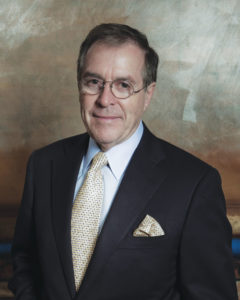 Industry icon Horst Schulze has decades of experience in the hospitality industry, as co-founder and former president of the Ritz-Carlton Hotel Company, and founder of Capella Hotel Group, an organization for which he still serves as chairman emeritus. Through that time, he’s seen the industry change and evolve, but one thing has remained—his dedication and passion for hospitality as a people-oriented business. Schulze wrote about this philosophy in a recent book, Excellence Wins: A No-Nonsense Guide to Becoming the Best in a World of Compromise, co-written with Dean Merrill, and here, he shares his insights with Hotel Business on the subject.
Industry icon Horst Schulze has decades of experience in the hospitality industry, as co-founder and former president of the Ritz-Carlton Hotel Company, and founder of Capella Hotel Group, an organization for which he still serves as chairman emeritus. Through that time, he’s seen the industry change and evolve, but one thing has remained—his dedication and passion for hospitality as a people-oriented business. Schulze wrote about this philosophy in a recent book, Excellence Wins: A No-Nonsense Guide to Becoming the Best in a World of Compromise, co-written with Dean Merrill, and here, he shares his insights with Hotel Business on the subject.
You’ve worked in hospitality for six decades. What are the biggest ways you’ve seen this industry change in that time? Everything has changed. It’s a totally different industry than when I started. When I started, there was one brand, and it wasn’t very large—Hilton. Can you imagine how many brands we have today? At the same time, segmentation has happened, where you now have segments from ultra-luxury, which I was involved in with Capella, to luxury, down to just a place to sleep—and, in the meantime, you have Airbnb. The industry has dramatically changed—not only an evolution that has been going on for 50 years, but a revolution. Now, of course, we have technology that, on one hand, eliminates some services and, on the other, supports service to the customer. We’re a totally different industry.
Hospitality is, first and foremost, a people business, but you’ve said in the past that customer care is the most undervalued and overlooked element in business today. Why is that? That’s the one thing that hasn’t changed. The customer still wants to be taken care of. The meaning of hospitality was that we take care of guests who come to our hotel. That meaning has changed to “We are here to offer shelter and a place to sleep” in many cases. In other words, sleeping commodities developed—and I’m not saying that’s wrong. It works, but it has changed. What we have to understand, and we seem to forget, is that human beings still like to be respected, cared for, have some attention and they have needs. Once they stay in our hotels, we have a responsibility to them. We should be ready to fulfill some of their needs that we don’t as a commodity really offer them anymore. That’s my problem: We should still know we’re related to hospitality, and it’s more and more being forgotten. Not in some individual hotels or ultra-luxury hotels—there it’s still the product and hospitality is still number one. In the rest of the hotel world, sleeping has become number one.
What are guests looking for? Of course, their basic purchase is a room and a bed. They want cleanliness, they want timeliness. What is missing in most brands today is making guests feel well, establishing well-being. And there is room for that. I arrived in New York this week at 11 p.m. and had to leave at 6 a.m. I wasn’t looking for major hospitality. In that moment, I was looking for shelter and sleep. There is room for that, but we have to differentiate between a hotel and a hotel with hospitality. A hotel with hospitality offers a real welcome, cleanliness, various abilities to eat, to get help for whatever is needed—because that is my headquarters, my home for the moment. If I want to eat something at midnight because I arrived late, I don’t want only two selections. In the past, you had a whole menu. Now you have a hamburger and a sandwich.
It’s the normal needs that were always fulfilled in the hotels of the past. There are a thousand little things, and some are very soft things. In the case in New York, when I came in with my suitcase, the front desk person didn’t say, “Good evening.” They said, “Checking in?” Those soft things are missing because we’re not teaching our employees anymore to welcome the guest. It may not seem important, but it is important because we’re dealing with human beings. We have to differentiate between hospitality and hotel.
In the sixth century, St. Benedict wrote a letter to his monasteries and said, essentially, “If a guest arrives, treat him as if it was Jesus himself. Even if you’re on a fast, join the individual so he has company, but first wash his feet.” That’s how he described hospitality. Some of us don’t even greet them anymore. We check in at a kiosk. That is not hospitality. But there is space for those kinds of places. I’m not against them, but they’re in the sleeping and shelter business.
How would you describe your philosophy for customer service? Understand who the customers are, what that market segment wants and deliver what it wants without defect, in a timely and caring way. Individualize as much as possible to service not only the market segment but the individual.
What’s your take on the bottom line? Don’t worry about the bottom line. Worry about the activity and actions and your product, which creates the bottom line. If I worry about my customers, the cleanliness and everything else, then I will have a bottom line. But if that’s being done wrong, if I judge my manager only on money, and my headquarters is a thousand miles from the hotel, and he makes a great profit and becomes the manager of the year and gets applauded, but at the same time, he took the flowers away, took the pianist away, doesn’t paint anymore, hardly ever cleans, doesn’t deep clean—he’s really destroying the brand. That’s what I’m concerned about, but it happens automatically because we only applaud the money. Or if we do measurements, the bottom line gets 90% and employee satisfaction and guest satisfaction get 5% each. If I made employee and customer satisfaction number one, then I would have a bigger bottom line. My point is: Have a better bottom line. My emphasis is on the profit, but making it by concentrating on the excellence of what you’re doing, not by concentrating on taking something away from the customer and making the soap a little cheaper. If I’m creating a product and the customer likes my product better than the competition, they will buy my product. That is bottom-line orientation. HB

